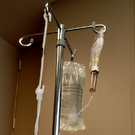Articles tagged with: ASH 2009 Meeting
News»

The year 2009 brought a lot of new and exciting advancements in the field of multiple myeloma. Over the course of 2009, The Myeloma Beacon covered more than 100 important myeloma-related studies.
To highlight the most important of these studies, the Myeloma Beacon surveyed leading physicians and researchers in the field. These physicians and researchers were asked to name the three peer reviewed journal articles published in 2009 and the three conference abstracts from 2009 that have the most important findings or implications relating to multiple myeloma.
The top three journal …
NewsFlash »
Panobinostat In Combination With Velcade Shows Potential For Relapsed Multiple Myeloma (ASH 2009) – Researchers presented results at the American Society of Hematology Meeting (ASH) from a Phase 1 clinical trial that show that oral panobinostat (Farydak, LBH589) in combination with intravenous Velcade (bortezomib) has anti-myeloma effects. Researchers tested different doses of both panobinostat (10 mg to 30 mg) and Velcade (1.0 mg/m2 to 1.3 mg/m2). They found frequent blood-related adverse events, such as thrombocytopenia (low blood platelet count) and neutropenia (low white blood cell count). They concluded that dosing will be modified for future Phase 2/3 studies. For more information, please see abstract 3852 on the ASH meeting Web site.
Afinitor Is Safe In Relapsed And Refractory Multiple Myeloma; Drug Will Move To Phase 2 Clinical Trials (ASH 2009) – Afinitor (everolimus) is safe in relapsed and refractory multiple myeloma, according to preliminary results from a Phase 1/2 clinical trial presented at the 2009 Meeting of the American Society of Hematology (ASH). Afinitor was given orally at 5 mg to 10 mg daily. Researchers observed only one case of thrombocytopenia (low platelet count). A sufficient amount of anti-myeloma activity was observed for this drug to continue to Phase 2 testing, which puts more emphasis on the efficacy of the drug. For more information, see abstract 3850 on the ASH annual meeting Web site.
ACE-011 Increases Hemoglobin And Helps Build Bone In Multiple Myeloma Patients Receiving Chemotherapy (ASH 2009) – Preliminary results from a study presented at the 2009 Meeting of the American Society of Hematology (ASH) reveal that ACE-011 (sotatercept) increases hemoglobin (an iron-rich protein in red blood cells) and bone formation, decreases bone pain, and has anti-tumor activity in multiple myeloma patients receiving chemotherapy. A low hemoglobin count indicates a low red blood cell count (anemia), which is a common complication in multiple myeloma, as are bone lesions, and bone pain. All participants were on a regimen of melphalan (Alkeran), prednisone, and thalidomide (Thalomid). For more information, see abstract 749 on the ASH meeting Web site.
Researchers Demonstrate Feasibility And Safety Of Vaccine In Multiple Myeloma (ASH 2009) – Preliminary results from a Phase 1 clinical trial of a multiple myeloma vaccine, presented at the 2009 Meeting of the American Society of Hematology (ASH), indicate that using a vaccine in multiple myeloma is possible and that it is safe and tolerable. The study included 15 patients who had undergone peripheral blood progenitor cell transplantation – a treatment in which stem cells are collected from the bloodstream of a healthy donor and delivered to the myeloma patient after high-dose chemotherapy. The most frequent side effects were local skin reactions, typical of most vaccines. Further studies will evaluate the vaccine’s full potential. For more information, see abstract 1858 on the ASH meeting Web site.
For more information about myeloma-related studies covered at ASH, please see the Myeloma Beacon coverage of the ASH 2009 Meeting.
News»

The findings of a new study suggest that a combination regimen of Velcade (bortezomib), thalidomide (Thalomid), and prednisone, abbreviated as VTP, is as effective as the standard combination of Velcade, melphalan (Alkeran), and prednisone, abbreviated as VMP, in the treatment of elderly patients with multiple myeloma. The trial also discovered that the addition of maintenance therapy led to increased response rates. Researchers presented their Phase 3 study results at the American Society of Hematology’s (ASH) 51st annual meeting in December.
While VMP without maintenance therapy currently is one …
NewsFlash »
ASH 2009 Conference Prompts Doctors To Change Myeloma Treatment Practices, Study Finds – A study conducted by Majestic Marketing Research Group discovered that 43 percent of doctors surveyed intend to change their multiple myeloma treatment practices based on results presented at the American Society of Hematology’s 2009 meeting. Most of these changes will increase use of either Velcade (bortezomib) or Revlimid (lenalidomide). The MM-015 study evaluating a Revlimid combination (see related Beacon news) left a particularly strong impression on the majority of doctors surveyed. For more information, please see the Majestic Research press release.
Sagent Pharma Launches Generic Alternative to Aredia – Sagent Pharma announced the launch of a generic alternative to Aredia (pamidronate disodium), a treatment for cancer-related osteoporosis marketed by Novartis Pharma. The injection will come in single-dose vials of 30 mg/10 mL and 90 mg/10 mL. For more information, please see the Sagent Pharma press release.
Terpenoid Therapeutics Raises $950,000 For Myeloma-Related Drug Development – Terpenoid Therapeutics has raised $950,000 of its intended $1.05 million for the development of two cancer drugs, one of which will treat bone disease associated with cancers such as multiple myeloma. Researchers anticipate the drug will cause fewer side effects than current treatment options. For more information, please visit the MedCity News Web site.
News»

A recent study compared out-of-pocket costs for multiple myeloma patients in the United States being treated with Velcade (bortezomib), Revlimid (lenalidomide), thalidomide (Thalomid), or another chemotherapy or radiation therapy. The results were presented at the American Society of Hematology (ASH) Meeting on December 5.
This study looked at approximately 1,900 multiple myeloma patients who filed claims with a national health insurance company. Researchers looked at out-of-pocket costs for each patient for a period of one year after the start of a new course of treatment.
For the 1,900 patients, …
News»

Preliminary results from an ongoing Phase 1/2 clinical trial suggest that elotuzumab, in combination with Revlimid (lenalidomide) and low-dose dexamethasone (Decadron), may have potential in the treatment of multiple myeloma. The findings were presented at the American Society of Hematology’s 51st Annual Meeting at the beginning of last month.
Dr. Ravi Vij from the University of Washington in St. Louis, co-author of the study, remarked, “The trial showed very high rates of response when elotuzumab is given in combination with Revlimid.”
Elotuzumab is a new drug that is currently …
News»

Multiple myeloma patients on various thalidomide (Thalomid) combination regimens may develop infections despite preventative drug measures, according to a data analysis performed by Italian researchers. The analysis also identified which factors increase a patient’s likelihood of experiencing severe infection. Researchers presented the results on December 6 at the 51st annual meeting of the American Society of Hematology (ASH) in New Orleans.
In the process of treating multiple myeloma, patients often experience a weakening in their immune system which makes them more susceptible to infection. Serious infections can lower a patient’s quality …

